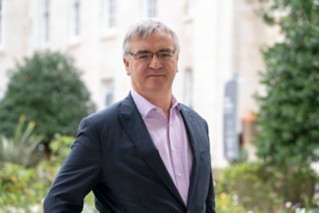
November 8, 2023, by Rob Ounsworth
Welcome to my first research update
I am delighted to share with you a research update, my first as Pro-Vice-Chancellor for Research and Knowledge Exchange.
I’m looking forward to building upon the work of my predecessors and the many colleagues across the university who support the delivery of our research strategy.
In my first few weeks in the job, I have been reminded how much fantastic research takes place at Nottingham. This is a place where we are ambitious and encourage our people to do high-risk, high-reward research. So much good work has been done in this area, and I’m committed to work with you to drive further progress in creating an environment where all researchers can realise their potential and achieve their ambitions.
A highlight was attending the Nottingham Quantum Initiative Research Showcase, where colleagues from all five faculties and 27 schools, centres and institutes shared insights into our capabilities in quantum information science and technologies research, from how diamond quantum sensing is revolutionising how we sense the world, to the potential of high-resolution imaging in fields from medicine to manufacturing, and the implications for artificial intelligence, machine-learning and human-computer interaction in every aspect of our lives. Representatives from funders including UKRI and Innovate UK and industry also attended and were highly impressed the interdisciplinary collaboration on show.
Another highlight demonstrating the quality of research at Nottingham is the landing two prestigious Synergy Grants from the European Research Council.
A team led by Professor Malcolm Bennett, of the School of Biosciences, and including Dr Leah Band (Biosciences and Mathematical Sciences), Dr Kevin Webb (Engineering), Dr Bipin Pandey and Dr Anthony Bishopp (both Biosciences) will receive £2.4m as part of a total €10M Synergy award. With scientists from Norway, Germany and Israel, the team will help future-proof crops in the face of climate change by better understanding how they sense water stress and adapt to rising temperatures.
Professor Sacha Mooney and Dr Craig Sturrock of the School of Biosciences have been awarded a £325,000 Synergy grant for a project bringing together scientists from the fields of history, climatology and biology to investigate historic plague outbreaks, and what they reveal about the factors that can lead to disease spreading from animals to humans. It brings together scientists from the University of Oslo, University of Stirling, University of Cambridge, France’s National Institute of Health and Medical Research, the University of Glasgow and the James Hutton Institute.
News of a collaboration with the Technical University of Denmark, which could minimise the global carbon footprint through the recovery of rare earth elements in waste, and a partnership with Luleå University of Technology in Sweden to improve the resilience of the world’s bridges, further underlines our commitment to work with partners across Europe and beyond.
Looking ahead: innovation clusters
We’re developing research and innovation clusters that will generate economic benefit for our region while addressing strategic challenges faced by the UK, including the drive to level-up. A zero carbon cluster, to accelerate the translation of zero-carbon technologies into commercialisation and real-world impact, will lead the way. As one of the eight research-intensive universities that make up Midlands Innovation, we are already playing a leading role in driving cutting-edge research, innovation and skills development and, as a member of the Midlands Engine, we are working to seize further opportunities to grow the largest regional economy outside London.
Preparing for REF
We are reviewing the university’s performance in the last Research Excellence Framework and laying the foundations in preparing for the next REF exercise. We know there will be a increased emphasise on engagement as well as impact, and greater recognition of ‘people and culture’ . These proposed changes are supported by our research strategy and commitment to building a welcoming, inclusive and high-performing environment for research.
Researchfish: get ready for 2024 submission window
Researchfish is an external, online platform that allows researchers to report to funders on the outcomes and impact of their research.
It’s an essential tool supporting the university’s research strategy and helps us demonstrate the value of more than £45bn of funding to universities from government, donors and stakeholders.
In 2023, the university increased its Researchfish compliance rate to 99.3%.You can create, edit, and attribute your outcome records in Researchfish at any time, and it’s good practice to keep them up-to-date so you are ready to submit the outcomes during the annual submission window.
For most funders, the 2024 submission window will open on Monday 5 February 2023 and closes at 4pm on Thursday 14 March 2024.
For guidance please contact the Business Analysis and Reporting Team on researchoutcomes@nottingham.ac.uk or visit the RKE Business Analysis Hub Sharepoint - Researchfish for more information
Institute of Physics award
Congratulations to Dr June McCombie, who has been awarded the 2023 Institute of Physics Phillips Award for her contributions to diversity and inclusion within physics and the STEM community. June, a specialist in molecular physics and astrophysical chemistry in the School of Chemistry, is a champion of the Institute of Physics Juno programme, which identifies best practice from female IOP members and raises awareness of gender issues. She was awarded the MBE in 2013 for services to science.
Recognition for breast cancer pathology pioneer
Professor of Breast Cancer Pathology Emad Rakha (School of Medicine) is to receive the 2024 International Society of Breast Pathology (ISBP) Larry Norton Award, which recognises individuals who have made outstanding contributions to the field. Emad has meanwhile joined a pioneering £100m NHS consortium set to use a ground-breaking Artificial Intelligence tool, Galen™ Breast, to speed up the diagnosis of breast cancer.
Farewell and thanks to Researcher Academy’s Jane Wellens
Jane Wellens, former Head of the Researcher Academy, has left the university for a new challenge with Staffordshire University. Jane led the transition of the Graduate School to the Researcher Academy, which extended support for postgraduate researchers to our whole research community.
Support and provision for postgraduate research students, research staff and PhD supervisors deepened under Jane’s leadership. Significant growth in doctoral training grants, researcher development projects and sector-leading researcher training provision are also part of her legacy. Jane played a key role in work to strengthen a culture of excellence for research and researchers at Nottingham, all of which help prepare for the challenges and opportunities ahead.
100 ways to change the world
Finally, the university is asking students and colleagues from all job families to help celebrate our impact on communities here in Nottingham, the UK and across the world.
We want your help in suggesting inspiring stories to feature on our growing 100 ways to change the world website.
This could be stories about how our pioneering researchers deliver solutions to complex global challenges. We’ll also celebrating how our work with communities, locally and globally, makes a difference, or how our teaching and all that we do as a university will help achieve the United Nations Sustainable Development Goals.
Please send your stories to changetheworld@nottingham.ac.uk.
Thank you in anticipation of your support and goodwill. I look forward to working with you.
Best wishes
Pro-Vice-Chancellor for Research and Knowledge Exchange
No comments yet, fill out a comment to be the first


Leave a Reply